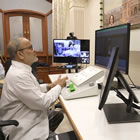|
Corindus’ Technology Successfully Used in World’s First-in-Human Telerobotic Coronary Intervention
CorPath® telerobotic interventional platform has the potential to deliver timely, specialized cardiovascular treatment to remote, underserved patient populations across the globe
|
 |

Dr. Tejas Patel performing world's 1st telerobotic PCI |
December 6, 2018 -- Waltham, Massachusetts -- Corindus Vascular Robotics, Inc. [NYSE American: CVRS], a leading developer of precision vascular robotics, announces that its CorPath technology was used to conduct the first-in-human (FIH) Telerobotic Intervention Study, December 4 and 5, 2018, in India. This study represents the world’s first percutaneous coronary intervention (PCI) conducted from a remote location outside of the catherization lab. Five patients located at the Apex Heart Institute in Ahmedabad, Gujarat, underwent an elective PCI procedure from a distance of roughly 20 miles (32 km) away. Each procedure was remotely performed by internationally acclaimed physician, Dr. Tejas Patel, Chairman and Chief Interventional Cardiologist of the Apex Heart Institute, from inside the Swaminarayan Akshardham temple located in Gandhinagar. His partner, Dr. Sanjay Shah, was in the room with the patient at the Apex Heart Institute. The success of this study paves the way for large-scale, long-distance telerobotic platforms across the globe.
“The first in human cases of remote robotic PCI represent a landmark event for interventional medicine,” stated Dr. Patel. “The application of telerobotics in India has the potential to impact a significant number of lives by providing access to care that may not otherwise have been possible. For the first time in cardiology’s history, India will shine for this ground-breaking innovation, and I am honored to be a part of this historic occasion.”
KEY TAKEAWAYS
Corindus’ telerobotic coronary interventional platform has the potential to:
- Dramatically improve patient access for both elective and emergent percutaneous coronary interventions in rural and underserved populations;
- Reduce time to treatment for emergent procedures such as STEMI;
- Reduce variability in operator skills, and thus improve clinical outcomes;
- Expand to other indications to address stroke care
|
|
Cardiovascular disease, including stroke, is the number one cause of death worldwide resulting in nearly 18 million deaths per year. Geographic barriers, socioeconomic status and a rapidly shrinking number of skilled specialists significantly hinder patient access to timely, specialized cardiovascular care. This is especially of concern during highly emergent medical events, such as heart attack and stroke, where ideally treatment is received in as little as 90 minutes or within 24 hours, respectively, to avoid death or permanent disability.
To improve patient outcomes, Corindus has pioneered the world’s first remote telerobotic interventional platform to deliver highly specialized and timely cardiovascular care to underserved patient populations with geographic barriers to treatment. Following the successful FIH telerobotic coronary stenting cases performed in India, the company plans to begin commercial product development for use of the CorPath System in remote interventions and expand the company’s robotic platform to address stroke care.
Mark Toland, President and Chief Executive Officer of Corindus, stated, “Cardiovascular disease, including stroke, is the world’s most significant and undertreated clinical problem due to limited access to specialized, timely medical care. As a result of existing barriers to care, including increased global poverty and a declining number of trained specialists, only a fraction of patients worldwide receives life-saving treatment, resulting in substantial death or disability. We anticipate that our technology will revolutionize cardiovascular disease treatment by providing specialized and timely medical care to anyone, anywhere.”
In September 2018, at the Transcatheter Cardiovascular Therapeutics (TCT) Conference in San Diego, the first live transmission of a remote robotic demonstration was streamed from Mayo Clinic using CorPath GRX with developmental remote technology in a porcine model. Recently the Mayo Clinic received a multi-year $3.3 million grant from The Leona M. and Harry B. Helmsley Charitable Trust to support exploring the feasibility and practicality of using remote robotic technology for cardiac interventions. Mr. Walter Panzirer, trustee of the Helmsley Charitable Trust, was in attendance for the FIH telerobotic study in India. “We are excited to see the next step successfully completed, which demonstrates cardiologists can safely operate remotely on patients,” said Panzirer. “This gets us one step closer to realizing our vision that rural populations can get time-sensitive cardiac interventions sooner, ultimately saving lives.”
Source: Corindus Vascular Robotics, Inc.
|

